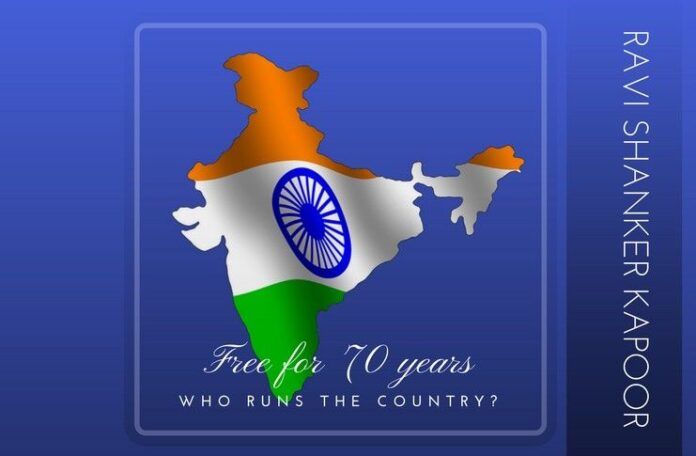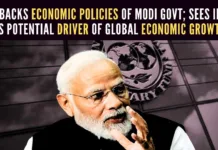
At a time when India is celebrating the 70th anniversary of Independence, it would be instructive to find how free India Inc is.
The manner in which industry representatives laud ministers are usually much more than expected of a gracious host; you say nice things about your guests, but our businessmen find such virtues in the guest ministers that the latter are not even aware of.
On the face of it, the answer is obvious: big industrials and business tycoons enjoy maximum freedom in every sense of the word. Aren’t they among the most powerful people (if not the most powerful people) in India, as also elsewhere? Doesn’t capitalism prevail everywhere? Capitalists set the agenda, keep politicians on their payoffs, mold public opinion by their ownership of the media and important institutions, and practically run the country. They are the real power behind the powerful.
Or so we are told by Leftists, intellectuals, parlor pinks, sundry analysts, and commentators. And since these worthies are usually wrong, the pertinent question remains there: are big industrialists freer today than they were during British rule? Our answer is a big ‘no.’
If we go by the statements the captains of industry regularly make, we find that their personas resemble that of obsequious supplicants rather than that of the guys calling the shots. They always plead with the government; they rarely criticize it. Their reaction to even the most anti-business policies is couched in a phrase like ‘The finance minister’s intention is indeed laudable but I would like to highlight the practical problems…’ Always ifs and buts; the mildest criticism is preceded and succeeded by fulsome praise of government’s ‘intentions’ which are always good.
The top business chambers, Ficci and the CII, invariably genuflect to the government of the day in their reactions the Union Budget or any other economic policy statement. As a business journalist, I have noticed that what businessmen say on record is usually diametrically opposite to what they say publicly.
I have attended innumerable events organized by business chambers. The manner in which industry representatives laud ministers are usually much more than expected of a gracious host; you say nice things about your guests, but our businessmen find such virtues in the guest ministers that the latter are not even aware of. I often used to wonder whether these capitalists were really the folks who run the country. Over the years, I got convinced that the real power lies with the politician; that businessmen-run-the-country-in-a-capitalist-system is just a myth propagated by communists and socialists.
“George Soros thinks President-elect Donald Trump will fail—and that will be just fine with the billionaire investor and supporter of progressive causes,” www.cnbc.com reported on January 19, 2017.
Worse, the power of the politician has grown since August 15, 1947. At the expense of the businessman (as also at the expense of the man on the street).
Before studying the politician-businessman ties before and after Independence, it would be instructive to see how free businessmen are in the United States. US President George Bush’s most-feared political opponents, for now, may not be Democratic presidential candidates, but a billionaire financier and anti-Bush advocacy groups with big-spending plans reported Reuters on December 26, 2003.
“Liberal special interests, led by billionaire currency trader George Soros, are raising millions in soft, unregulated money to defeat President Bush,” the Bush campaign said in an Internet posting. Soros confirmed the funding. “My contributions help to ensure that the money spent on trying to re-elect President Bush doesn’t overwhelm the process,” he said in a Washington Post opinion piece earlier in that month.
“Soros—whose new book on the subject is The Bubble of American Supremacy—said he was ‘deeply concerned with the direction in which the Bush administration is taking the United States and the world’,” reported Reuters.
Soros’ antipathy towards the Republicans is unabated. “George Soros thinks President-elect Donald Trump will fail—and that will be just fine with the billionaire investor and supporter of progressive causes,” www.cnbc.com reported on January 19, 2017.
Quoting the Center for Responsive Politics, the website also reported that during the 2016 campaign, Soros donated close to $20 million to various causes, including more than $10.5 million to Trump’s opponent, Democrat Hillary Clinton.
“I personally am convinced that he is going to fail,” Soros told Bloomberg during an interview at the World Economic Forum in Davos, Switzerland. Failure will come “not because of people like me who would like him to fail, but because his ideas that guide him are inherently self-contradictory and the contradictions are already embodied by his advisors.”
During UPA II, when policy paralysis and mindless populism made doing business a nightmarish experience, a few captains of industry also expressed their displeasure over the state of affairs.
George Kaiser, an oil tycoon with a net worth of $10 billion, was a major donor to the 2008 Obama campaign. Berkshire Hathaway CEO and the world’s fourth richest man, Warren Buffett, endorsed Hillary Clinton as the Democratic nominee for president, though his financial contribution was very small. DreamWorks CEO and producer Jeffrey Katzenberg was a top supporter of Obama’s 2012 campaign, contributing about $2 million.
The Republicans are not without their supporters in the corporate world. The Koch Brothers, David H. Koch, and Charles Koch, both in their seventies, together own Koch Industries. They have reportedly contributed over $100 million to conservative causes, including the Tea Party movement. In fact, more billionaires support conservative Republicans than they support the liberal Democratic Party.
It is, however, not the financial support that business persons provide to politicians and parties that are pertinent; what interests us is the attitude adopted by industrialists towards political leaders and causes. Soros slams Bush and Trump in no uncertain terms.
The question is: is this possible in India? Well, to be sure, once in a while, some courageous industrialists like Rahul Bajaj speak their mind. During UPA II, when policy paralysis and mindless populism made doing business a nightmarish experience, a few captains of industry also expressed their displeasure over the state of affairs. Sometimes, the measures adopted by the government are so intolerable that they had to raise their voice. It happened when in 2012 the then finance minister Pranab Mukherjee introduced retrospective taxation. But in every case, the displeasure expressed is measured and calibrated; it is a fervent petition rather than a vehement protest.
But India’s magnates don’t exercise their democratic right to slam a politician or party; they never say anything exceptional on any contentious issue; they rely solely on platitudes and clichés. There is no Soros in India, and can never be. Business leaders have been effectively tamed by the state.
It is astonishing that the situation was exactly the opposite when India was ‘under the yoke of British rule.’ In that era, Indian industrialists not only openly opposed the imperial government but also generously contributed to the coffers of the Congress Party, the principal Indian organization fighting the British Raj. Further, many of them worked closely with the grand old party to campaign against the Empire.
To be continued…
- Liberty Is Penalized, Violence Goes Untouched - December 21, 2019
- Rahul’s Howdy bloomer - September 22, 2019
- Chidambaram’s hypocrisy - August 22, 2019











India will progress Only if india is declared as Hindu Nation. Millions Hindus converts as muslims and christians and Leftist working for enemy on their payroll will make sure india never progresses. First stop this conversion second stop funding , start rebuilding india and remove invaders icons from the indian land then from minds by changing books .